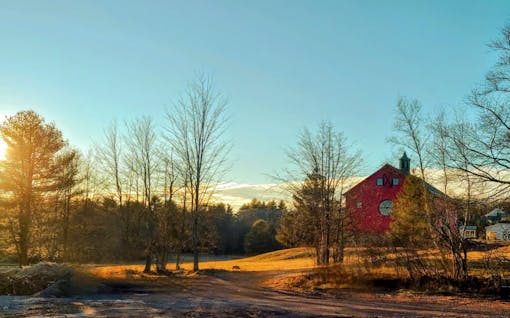
Torrwood Farm grows their cannabis in living, 200-year-old soil
For nearly two centuries, this New York farm has harvested organic crops, horses, and now legal cannabis.
Immigrants have always come to the United States in search of a better life. But they cannot predict what their descendants will do in a new land. Lucas Kerr's hard-working ancestors probably never imagined that their family farm would one day grow extensive cannabis plants.
Kerr's family came from Scotland in 1840 and settled on a few hundred acres in the Catskills in 1846 to pursue their American dream. Torrwood Farm, as it is called, has had many things to offer over the last two centuries – organic crop harvesting, a horse farm, chestnut tree replanting areas and an aquatic farm with some of the cleanest water in the country. Today, the leafy stems of cannabis grow among black walnut trees, seasonal vegetables and apple orchards.

Kerr didn't expect to go into farming. He would visit the historic site with his extended family on vacation, but his dreams lay elsewhere. During the Iraq War, Kerr joined the military and worked his way up to the coveted 75th Ranger Regiment. He did, as he puts it, “quite a few” tours and returned to civilian life with a business plan that landed him a contract with the Department of Defense. But he noticed that many of his comrades were not doing so well. Veterans struggling with injuries were given opioids without much supervision or consideration for side effects, while others struggled to cope with the post-traumatic stress of combat after a sudden return home.
“I lost more friends to suicide and the opioid epidemic where the VA was just handing out pills like candy…It was crazy. As I became more involved and developed in the cannabis industry, I just said, 'This is the answer for a lot of these people.'”
Lucas Kerr, Torrwood Farm
Kerr, like many veterans – including cannabis pioneer Dennis Peron – discovered that cannabis offered a holistic medical alternative. While New York established its medical marijuana industry in 2016, it exclusively licensed multi-state operators with a limited range of products.
After the passage of the 2018 Farm Bill, Kerr began researching hemp in hopes of eventually making bandages for the Army. He was living in California when the pandemic hit, but took the risk to fly back to New York and lay the groundwork for his first hemp crop. “I just bootstrapped and went out there with no farming experience and just started figuring it out on the fly,” he told Leafly this fall.
Kerr began growing hemp in anticipation of adult-use legalization in New York and received his cultivation license in 2022; He later also acquired licenses for editing and distribution. But cannabis is a fickle plant, and after a long search for the perfect lead grower, Kerr hired Paul Bernal to manage the grow.
Bernal grew up in New England but learned the cannabis trade in Humboldt, California. His methods reflect the symbiotic Californian approach. He tries to feed the crop with materials from the farm's surroundings, harness sunlight, and grow both terpenes and cannabinoids.
“We want to give people uniqueness…The one thing those old hippies always taught me is, 'Take care of the soil.' It's all about the local biology you put into the soil – so you get the best result you can expect from working with nature this year. So every year is different. Every plant is different.”
Paul Bernal, Torrwood Famrs
Torrwood currently cultivates, processes and distributes a growing range of products, including flowers for Doobie Labs, prerolls for Dash and Weekenders, and a new line of gummy edibles. Both Paul and Lucas expect 2025 to be the year that Torrwood's own brand hits the market with a range of unique genetics to allow consumers, as Bernal puts it, “to take their vision in that direction to go where they want to go”. Harvest time has become a family affair, with Kerr relatives flocking to help trim the plants.




Post a comment: